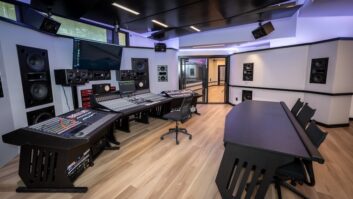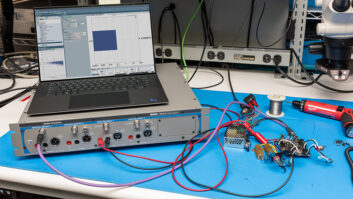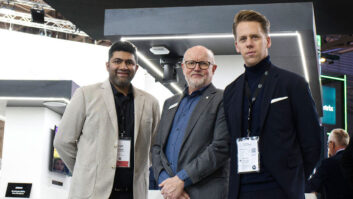AES Educational Foundation Grants 2020 Scholarships
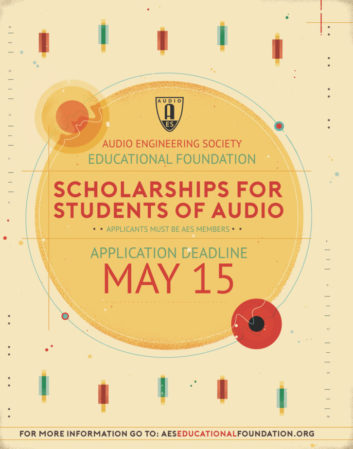 The Audio Engineering Society Educational Foundation has announced the recipients of the AES Educational Grants for Graduate and Undergraduate Studies in Audio Engineering for 2020. The announcement was made by the new AES Educational Foundation president, Jim Anderson, who took office earlier this year. This year’s grant recipients are:
The Audio Engineering Society Educational Foundation has announced the recipients of the AES Educational Grants for Graduate and Undergraduate Studies in Audio Engineering for 2020. The announcement was made by the new AES Educational Foundation president, Jim Anderson, who took office earlier this year. This year’s grant recipients are:
- Audio Precision Tom Kite Advancing Audio Scholarship: Hyunjoung Yang, attending University of Miami, Frost School of Music, Coral Gables, Fla.
- Dolby Institute Scholarship: Jacob Melchi, attending University of Rochester, Rochester, N.Y.
- Genelec’s Ilpo Martikainen Audio Visionary Scholarship: Braden Carei, attending Belmont University, Nashville, Tenn.
- L-Acoustics’ Dr. Christian Heil Future of Sound Scholarship: Dora Filipovic, attending University of Surrey, Faculty of Arts and Social Sciences, Surrey, England
- PMC Sound for the Future Scholarship: Ausma Lace, attending McGill University Schulich School of Music, Montreal, Quebec
- Emil Torick Award: Andrew Bohman, attending the Peabody Conservatory of the Johns Hopkins University, Baltimore, Md.
- John Eargle Award: Matthew Cheshire, attending Birmingham City University, Birmingham, England
- Bruce Swedien Scholarship: Mie Hirschfield, attending McGill University Schulich School of Music, Montreal, Quebec
- Larry Estrin Scholarship: Anthony Hunt, attending University of York, York, England
- Mary Lea Simpson Memorial Scholarship: Téa Mottolese, attending Peabody Institute of the Johns Hopkins University, Baltimore, Md.
- AES Educational Foundation Scholarship: Bartlomiej Chojnacki, attending AGH University of Science and Technology, Krakow, Poland
- AES Educational Foundation Scholarship: Alexander Dobson, attending McGill University Schulich School of Music, Montreal, Quebec
- AES Educational Foundation Scholarship: Ayla Favati, attending New York University Steinhardt School of Culture, Education, and Human Development, New York, N.Y.
- AES Educational Foundation Scholarship: Claudia Nader Jaime, attending University of York, York, England
- AES Educational Foundation Scholarship: Julian Neri, attending McGill University Schulich School of Music, Montreal, Quebec
- AES Educational Foundation Scholarship: Ben Payne, attending University of Plymouth, School of Humanities and Performing Arts, Plymouth, England
- AES Educational Foundation Scholarship: Daniela Pardo Quintana, attending Pontificia Universidad Javeriana, Bogota, Colombia
- AES Educational Foundation Scholarship: Kathleen Zhang, attending McGill University Schulich School of Music, Montreal, Quebec
The AES Educational Foundation receives support from individual benefactors and companies that support education in audio, including in-memoriam contributions. Application forms and additional information are available on the Audio Engineering Society website.
Belmont Grad Student Receives AES Audio Visionary Scholarship
Braden Carei, a graduate student of Audio Engineering and a track student-athlete, was selected as the recipient of the 2020 Dr. Ilpo Martikainen Audio Visionary Scholarship, a grant that was established in 2018 in honor of Genelec’s late founder Dr. Ilpo Martikainen. Genelec offers this scholarship in association with the Audio Engineering Society Education Founda
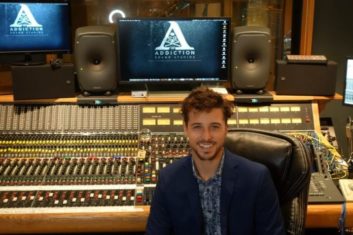
tion to students who have a passion of advancing audio through innovation and technology development.
Now in his second year of Belmont’s Masters of Audio Engineering program, Carei studied both audio engineering and computer science at Belmont for his undergrad. He worked closely under the direction of advisor Dr. Eric Tarr to develop a cochlear implant and hearing-aid simulator that runs in real time in a digital audio workstation. The project was later reconstructed as an iOS application, and Carei and Tarr presented this project at IHCON and the Midwest Conference on Cochlear Implants.
Another project of note is Carei’s website created with Dr. Scott Hawley to classify audio samples. In his first year of graduate research, Carei ran a study to find whether or not germanium transistors have a perceptual sonic difference when compared to a silicon transistor. He noted to Genelec, “Utilizing guitar pedals with these transistors, it was found that the there was a perceptual difference at low distortion levels and that there was no preference difference between the tones of the circuits.”
Carei told Genelec that his future goal is to be an Audio Digital Signal Processing Engineer. “My degrees in both computer science and audio engineering will help me in this field,” he said. “I would like to help an organization make sure that the most recent deployments of software are running as efficiently as possible.”
The Blackbird Academy Summer Camps
From the founding of The Blackbird Academy, John and Martina McBride considered it important that besides the advanced curriculum in studio and live sound, they wanted to establish a means of introducing high school students to professional music production. Specifically, how to record a song over three days in a summer camp environment.
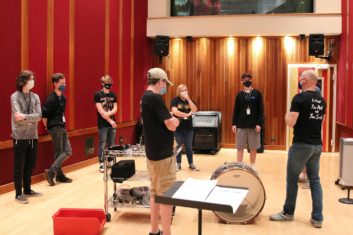 The summer of 2020 proved a bit more challenging. The three-day session in June was canceled due to shutdown protocols, but in July and August, The Blackbird Academy welcomed groups of eager students, under proper safety and hygiene protocols, from both coasts and everywhere in between to learn how to record a song. Six music-loving teens were on hand August 5-7.
The summer of 2020 proved a bit more challenging. The three-day session in June was canceled due to shutdown protocols, but in July and August, The Blackbird Academy welcomed groups of eager students, under proper safety and hygiene protocols, from both coasts and everywhere in between to learn how to record a song. Six music-loving teens were on hand August 5-7.
Day one was an orientation to the studio, a mic shootout, and learning all about outboard gear. Day two was tracking a live band. The campers also had the chance to play live in the studio and see what it’s like to be the engineer/producer. Day three was time for mixing in Blackbird Studios E and F.
The professional Nashville artist/songwriter/players the campers recorded included: Folk singer-songwriter John Dennis playing acoustic guitar and singing lead vocals; Adam Fluhrer (road manager and guitarist for multi-platinum country artist Lee Roy Parnell) on guitar; Brian Kilian on drums, and Bryan Clark on bass and steel guitar (and an instructor/engineer).
The Blackbird Academy’s High School Summer Recording Camps are held at the world-renowned Blackbird Studio in Nashville, Tenn. High school–age teens (13-19) learn how to make a record where some biggest names in music have been recorded and produced, woring on the same gear, and in the same studios, professional producers and musicians use every day to make hit records.
CRAS/KMD Productions Host Virtual PAMA Mentoring Event
As a means of continuing to provide students with access to industry professionals during the pandemic, the Conservatory of Recording Arts & Sciences partnered with Karen Dunn of KMD Productions to host a Professional Audio Manufacturers Alliance “Career Opportunities in Pro Audio Product Companies” Zoom panel session for 50 CRAS students.

“This was a terrific event and was designed as an informational webinar to help CRAS’ near-graduation students learn about the companies that design and manufacture the gear they will be using as their careers advance,” Dunn said. “There are employment path opportunities inside these companies that can be an excellent complement to a musical career. We were lucky to have senior executives from four of these top-tier brands on our panel. It would ordinarily be very difficult for students, or other early-career stage folks, to access these resources.”
This PAMA event included Joe Andrulis, Biamp Executive Vice President of Corporate Development; Greg Beebe, Sennheiser, Director, Professional Audio; Karam Kaul, HARMAN International VP Global Product Line Management Professional Audio; and John Maier, BLUE Microphones CEO.
“The PAMA Panel was absolutely incredible,” said David Kohr, CRAS Instructor/Event Coordinator. “CRAS students got solid information about careers at pro audio product companies from professionals that have years of experience in the industry. They explained it in such a great way that they answered many of the questions that anyone might have had before the students even had to ask them. They also cleared up any misconstrued ideas of what someone might have thought working in this field of the industry would be like.”
Delta Music Institute Awarded Grant from Mississippi Arts Commission
The Delta Music Institute at Delta State University recently received a $4,300 project grant from the Mississippi Arts Commission.. The funds will be allocated to a virtual camp for high school students exploring entertainment industry career tracks in audio engineering, singer/songwriting, and instrumental performance.
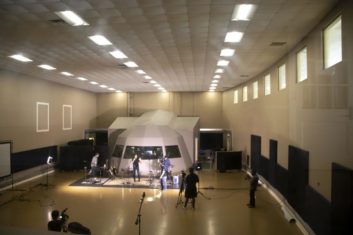 After suspending the annual DMI summer camp due to Covid-19, Richard Tremmel, director of the DMI, and his staff had to devise an alternate plan for interacting with high school students that provided opportunities for them to experience elements of the entertainment industry.
After suspending the annual DMI summer camp due to Covid-19, Richard Tremmel, director of the DMI, and his staff had to devise an alternate plan for interacting with high school students that provided opportunities for them to experience elements of the entertainment industry.
“The MAC project grant will help support the finances needed to implement an online version of our camp and introduce campers to audio recording, songwriting, and performance,” said Tremmel.
The DMI is an independent center under the College of Arts & Sciences at Delta State, located in the former Whitfield Gym. Its recording facilities include Studio A, featuring a 48-channel SSL Duality Delta console and a pair of Barefoot MicroMain27 and Yamaha NS10 monitors, alongside a large format live room able to accommodate orchestras, concert bands, choirs, and wind ensembles and includes
The design for the studios was created by veteran engineer/producer Norbert Putnam, who remarked, “When I first entered the old Whitfield Gym, I was struck by the amazing reverb being generated by the hard reflective surfaces. It reminded me of Abbey Road’s Studio 2 in London.” Putnam continues, “The symphonic room at DMI may well be the largest studio of this type in the academic world.”
LA College of Music Renovation Includes New SSL ORIGIN Console
Over the summer, Los Angeles College of Music renovated the Student Recording Studio at its campus in Pasadena and installed a new 32-channel Solid State Logic ORIGIN analog in-line mixing console, completing the project in time for the Fall 2020 semester. Once classes resume, the studio will be used by faculty member Andrew “Mudrock” Murdock, known for his work with Godsmack, Avenged Sevenfold and others, to teach students the fundamentals of audio engineering and production.
“At first, I was thinking we should buy something used,” says Murdock, who has been teaching at LACM since 2011. “But Andre Knecht, Music Producing and Recording Department Head, said, ‘Let’s look for something new.’ He showed me the ORIGIN brochure and I said, looks good to me! It looks familiar; it’s got the classic SSL look. And it sounds great.”
The newly renovated Student Recording Studio at LACM is equipped with a variety of outboard analog processing and effects gear. The control room was already outfitted with a pair of Dynaudio BM15 nearfield monitors and other items, but the school acquired some new pieces during the studio refurbishment.
“We already had a pair of Distressors and A-Designs Pacifica mic preamps. We bought some Warm Audio compressors and a Klark Teknik stereo graphic equalizer,” Murdock adds. “And we’ve also added one of my Lexicon PCM70s, which is an amazing reverb, and a stereo Yamaha delay.”
Peabody’s Tuned-In Program Receives $1.25 Million Gift
Legendary investor and former Johns Hopkins philosophy student William H. “Bill” Miller III has committed $1.25 million to the Tuned-In program at the Peabody Institute of the Johns Hopkins University. Established in 2007 at the Peabody Preparatory, the Tuned-In program provides Baltimore City Public Schools students with a complete Peabody Preparatory education for free in pursuit of its mission of driving social change through music.
“I am delighted to be able to support Peabody’s Tuned-In program and its important work to nurture the next generation of musicians,” noted Miller about his gift. “Music, philosophers have said, is the most profound of all the arts, and I personally have always found both solace and inspiration in listening to great music. My hope in making this commitment is to help ensure a vibrant future both for promising young musicians in Baltimore and for the art form itself.”
Tuned-In uses music as a tool for youth empowerment by teaching life skills that are necessary for music training, including collaboration, leadership, goal-setting, and creativity. Students in the program are predominantly from low-income backgrounds; Tuned-In provides access to introductory and advanced musical study and youth development opportunities, opening doors for success in college and career. (Since the program’s inception, nearly 100% of Tuned-In graduates have completed high school and attended college.)
Miller’s gift will provide needed technology devices and upgrades for students, expand summer programs to provide deeper engagement for students and families, and strengthen the program’s ability to retain enrolled students by increasing investment in those at risk of attrition.
“Mr. Miller’s extraordinary support of this program will literally change lives,” noted Peabody Preparatory director Maria Mathieson. “We have seen how Tuned-In helps students discover pathways and possibilities they might never have known were available to them, and we know it helps them develop the skills and confidence to pursue those opportunities. Mr. Miller’s generosity will open up so much more potential for so many more young people in Baltimore.”
USC Deploys Dante Campus-Wide for Hybrid Distance/On-Campus Learning
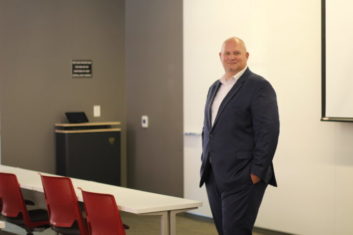
As the foundation for a new hybrid distance/on-campus educational program rolled out this Fall, the University of Southern California has deployed a vast AV network to more than 248 learning environments. According to Joe Way, USC Director of Learning Environments, the Dante-powered systems enable faculty to simultaneously give lectures on campus, on-stream and also archive for future use.
Way says that the system also facilitates classroom overflow—a result of classroom occupancy levels being dropped by up to 70 percent to accommodate social distancing. In this scenario, the faculty-member will be present in a classroom with a small group of students, with additional small groups participating in the same lecture from adjacent rooms. The overflow rooms are equipped with cameras, microphones, displays/projectors, and networked sound systems to facilitate interaction.
“The system needs to be flexible to change at any time,” Way says, acknowledging the dynamic nature of the pandemic. “We are moving to all-network-based AV that will allow us to transmit any signal to any location. Dante is critical in our ability to lecture-capture and microphone-share.”
Way and his team developed a templated approach that can be modified to facilitate varying workflows depending on the subject, department and lecturer-preferences. The core of the system, however, is a Crestron Flex UC Engine (the B140-Z or C160-Z, where Z stands for Zoom). These allow users to take a Zoom Virtual Room and make it live—using all NVX352s to encode and decode Dante. Dante-enabled Shure networked mics—either MXA 910s or 710s—are used for lecture and student capture. Dante AVIO units are also widely used as encoders with some handheld mics and as output when the team needs to zone the room and cut the speakers near the microphone.
“It’s critical that our system be as cloud-based and software-based as possible,” Way said. “By using Dante Domain Manager we’re able to ensure we have complete observability, control and security across the network. And we’re able to utilize it both with the scheduling system we have and with individual instructor preferences. For the most part, faculty will be able to walk in at their scheduled time and the room will be ready for the way they want to teach. With things like Dante’s audio routing at our fingertips, we can set it all up ahead of time.”

